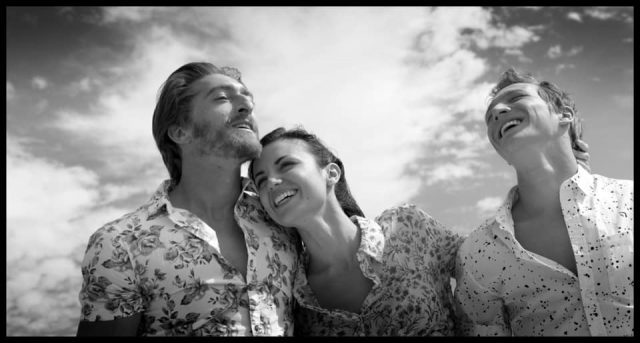
Neyssan Falahi, Cristina Rambaldi, and Mattia Minasi play a trio of pretty lovers in Svetlana Cvetko’s Show Me What You Got
SHOW ME WHAT YOU GOT (Svetlana Cvetko, 2020)
Opens Friday, February 12
www.showmewhatyougot.film
www.levelforward.live
Cinematographer Svetlana Cvetko pays homage to the French New Wave in her second feature-length film, Show Me What You Got. Her follow-up to the Netflix thriller Deadly Switch is a riff on François Truffaut’s menage-a-trois classic, Jules and Jim, spiced up with elements of Jean-Luc Godard (Bande à part) and Agnes Varda (Cléo from 5 to 7), photographed in black-and-white so it often resembles a TV ad for perfume. It looks great, but there’s only so much compassion the audience will be able to dredge up for the three protagonists, a trio of lost, pulchritudinous twentysomethings searching for home as they get it on in modern-day LA.
Looking like a young, red-haired, freckle-faced Bon Jovi, Mattia Minasi is Marcello, the gorgeous son of an Italian soap opera star (Pietro Genuardi), who has been sent to LA to have a series of meetings about future projects for his father. Scraggly bearded Adrien Brody doppelgänger Neyssan Falahi is Nassim, a wannabe actor whose father wants him to return to the family in Tehran and whose mother (Anne Brochet) wants him to visit her in Paris. And former dancer Cristina Rambaldi, a compelling mix of Maria Schneider and Giulietta Masina and the granddaughter of Oscar-winning special effects wizard Carlo Rambaldi (Alien, E.T.), is Christine, a visual artist working at the Back on the Beach Café who had been living in her grandfather’s room at a nursing facility until he passed away, devastating her. All three millennials are searching for purpose in their lives as well as for a sense of home, and they find that in one another, particularly in bed, where they interact with a furious freedom and a wild abandon, with no thought about how long that can last as the real world hovers ever closer.
At one point, Christine leads them to an art campground in the middle of nowhere in the Joshua Tree desert, where they sit on the edge of a large boat on a hill. The omniscient narrator says, “Each of them empathize with this boat differently. Marcello relates to it as adrift but adventurous. Nassim sees it as out of place. Lost on its journey. Christine believes the boat could be Noah’s Ark, where all the people she’s truly loved, living or dead, could be together, forever.” The narration is intimately delivered in French by Anne-Laure Jardry, a friend of Cvetko’s, over lovely shots of the boat, the three lovers, and the vast landscape as Eric Avery’s score plays. The scene is an example of what doesn’t quite work in the film: Each part on its own is lovely, but when put together it reveals the central flaw, that Cvetko tells instead of shows, continually explaining in detail what we should be learning or already know from the narrative itself, rather than from the narration, which can be lovely and poetic at times as it spells it all out for us. It’s also difficult to empathize with the three characters, who are living quite the youthful life in the now as they abandon thinking about what comes next. They also each are dealing with the patriarchal part of their families, either a father or grandfather; Cvetko suffered the loss of her own father while filming, and cowriter, producer, and editor David Scott Smith’s father passed away during the editing stage.
Cvetko (Red Army, Inside Job), who has photographed numerous documentaries, shoots the film in a cinéma verité style that makes us flies on the wall of this polyamorous relationship. The director encouraged the actors to improvise, which brings an immediacy to the film as well as a forced naturalism. One of the best scenes is when Christine is in a bathtub, fully clothed, experiencing either a flashback or an imagined fear, with haunting music by Avery. Cvetko cuts to Nassim shadowboxing in front of a mirror, then over to Marcello, deep in thought on a couch, and back to Christine, rolling around on the floor, overcome with emotion. There’s no dialogue, no narration, just the three of them, seen individually, and we begin to understand them in new ways. When they appear together onscreen again, that moment becomes a memory for us, and I wished for more scenes like that during the film, hoping Cvetko would trust the viewer to figure things out on their own. Alas, she shows us too much of what she’s got.
Show Me What You Got releases virtually on February 12. On February 14 at 8:00, Level Forward will host the screening and live event “The Sensuality of Show Me What You Got,” with clinical sexologist Dr. Laurie Bennett-Cook, followed February 15 at 8:00 by “Filmmaker’s Workshop: The Vision & Visual of Svetlana Cvetko,” with Cvetko.